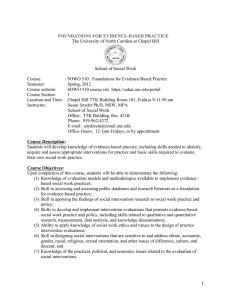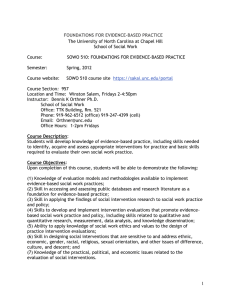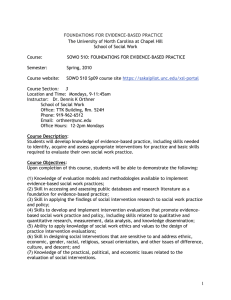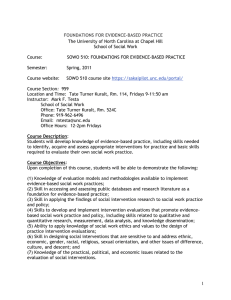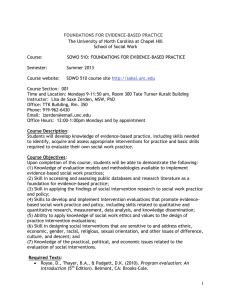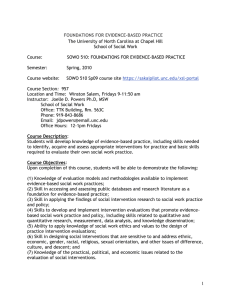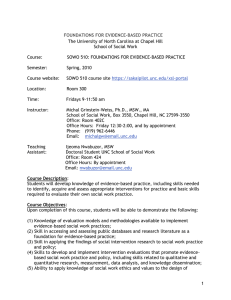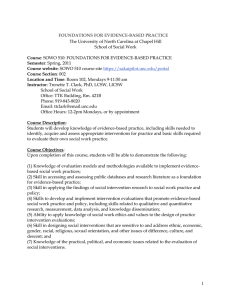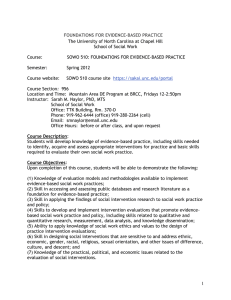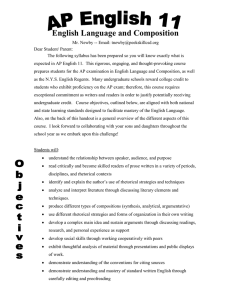The University of North Carolina at Chapel Hill
advertisement
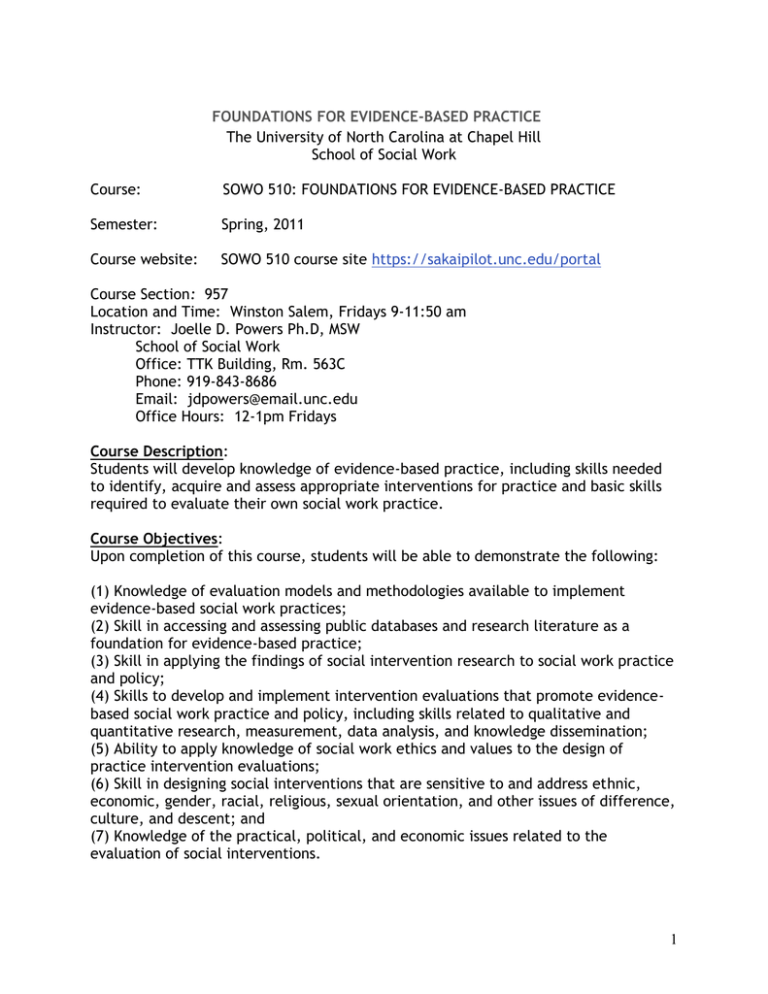
FOUNDATIONS FOR EVIDENCE-BASED PRACTICE The University of North Carolina at Chapel Hill School of Social Work Course: SOWO 510: FOUNDATIONS FOR EVIDENCE-BASED PRACTICE Semester: Spring, 2011 Course website: SOWO 510 course site https://sakaipilot.unc.edu/portal Course Section: 957 Location and Time: Winston Salem, Fridays 9-11:50 am Instructor: Joelle D. Powers Ph.D, MSW School of Social Work Office: TTK Building, Rm. 563C Phone: 919-843-8686 Email: jdpowers@email.unc.edu Office Hours: 12-1pm Fridays Course Description: Students will develop knowledge of evidence-based practice, including skills needed to identify, acquire and assess appropriate interventions for practice and basic skills required to evaluate their own social work practice. Course Objectives: Upon completion of this course, students will be able to demonstrate the following: (1) Knowledge of evaluation models and methodologies available to implement evidence-based social work practices; (2) Skill in accessing and assessing public databases and research literature as a foundation for evidence-based practice; (3) Skill in applying the findings of social intervention research to social work practice and policy; (4) Skills to develop and implement intervention evaluations that promote evidencebased social work practice and policy, including skills related to qualitative and quantitative research, measurement, data analysis, and knowledge dissemination; (5) Ability to apply knowledge of social work ethics and values to the design of practice intervention evaluations; (6) Skill in designing social interventions that are sensitive to and address ethnic, economic, gender, racial, religious, sexual orientation, and other issues of difference, culture, and descent; and (7) Knowledge of the practical, political, and economic issues related to the evaluation of social interventions. 1 Required Texts: Royse, D., Thayer, B.A., & Padgett, D.K. (2010). Program evaluation: An introduction (5th Edition). Belmont, CA: Brooks-Cole. Hatry, H., van Houten, T., Plantz, M.C. & Greenway, M.T. (1996). Measuring program outcomes: A practical approach. Alexandria, VA: United Way of America. Rubin, R. & Babbie, E.R. (2010). Essential research methods for social work (2nd Edition). Belmont, CA: Brooks-Cole. Supplemental readings are available on Sakai or through UNC libraries databases. Additional supplementary readings may be recommended or assigned at the discretion of the instructor. Accommodations for Students with Disabilities: Students with disabilities, which affect their participation in the course, should notify the instructor if they wish to have special accommodations in instructional format, examination format, etc., considered. Accommodations and services are provided by Disability Services (Voice/TDD 962-8300; 966-4041). Learning Disability Services (9627227) provides supportive services for students with learning disabilities and attention-deficit/hyperactivity disorders. Policy on Academic Dishonesty: Academic dishonesty is contrary to the ethics of the social work profession, unfair to other students, and will not be tolerated in any form. All written assignments should include the following signed pledge: “I have neither given nor received unauthorized aid in preparing this written work.” Teaching Methods and Accountability: SOWO 510 is a hybrid/blended class which includes a combination of in-person class sessions and on-line lessons. Students are expected to meet for class as the syllabus outlines as well as complete all online activities. Most in-class sessions will include class discussion of critical content issues/questions and skill-building activities. Assignment Guidelines: All written assignments must be typed and follow APA format. Several writing resources are posted on the website. Students should also refer to the following: American Psychological Association. (2009). Publication manual of the American Psychological Association (6th ed.). Washington, DC. Note: You can find a self-paced tutorial for APA style at http://www.lib.unc.edu/instruct/citations/apa/index.html Assignments: Online Quizzes: Most on-line Sakai lessons include an online quiz. The quizzes will test students on online content/materials and the assigned readings for that lesson. The 7 quizzes 2 comprise 35% of your course grade (5% each), and cannot be made up after the due dates which are listed in the course outline. Students will have 1 hour to complete each quiz (10 questions) Quiz questions will be randomly assigned from a question pool You may re-take the quiz one additional time (your highest score will be recorded in Sakai) CITI Research with Human Subjects Training: Students will complete the on-line CITI ethics training. The CITI Research with Human Subjects Training provides an opportunity to review historical and current standards for ethical research that involves human subjects. Allow a minimum of 3 hours for completion of online training. The training is worth 5% of your overall course grade and is due Feb 4. In-Class Labs There will be 4 in-class labs throughout the semester that will provide an opportunity for hands on experiences with multiple aspects/components of the research and evaluation process. The labs comprise 20% of your overall course grade (5% each) and are each due the week after the in-class activity. Final Exam: Evaluation Proposal Paper and Presentation (Due April 8 and 15) A proposal for an evaluation project related to your field placement or specific social work interests will be developed by each student. This 7-10 page paper will include the following components: Introduction, Literature Review, Research Questions(s), Methods (evaluation design, study sample, measures) and References. Each student will present a summary of their evaluation to the class in 15 minutes. The paper and brief class presentation is worth 40% of your overall grade. Ts Assignments and Course Performance Assessment: Quizzes CITI training Labs Final Exam Course Total 35% 5% 20% 40% 100% Grading System: Points <69 70 - 79 80 - 93 94 - 100 Grade F L P H Late Assignments: Late assignments are strongly discouraged. In case of a dire, life-threatening 3 emergency, a late assignment may be accepted at the discretion of the instructor. If permission for late submission is not granted before breaking a deadline, the grade will automatically be reduced 10%, and another 10% reduction will occur each day (including weekends). Please note that technical difficulties are not an acceptable excuse for turning in an assignment or quiz late. All technical inquiries should be directed to the staff of the SSW Computing Information and Technology Unit (CITU). Please contact Manuel Garcia at megarcia@email.unc.edu or 919-962-6416. COURSE OUTLINE AND ASSIGNMENTS PART I: USING THE EXISTING EVIDENCE BASE IN PRACTICE Week 1, Jan 14: Introduction to Hybrid Course and Sakai Students will not have an in-class session this week Goal: By the end of this week, the student will understand how to proceed with the hybrid course and access/utilize Sakai and all on-line materials. Assignments: To familiarize yourself with the structure and format of the course, please review some of the materials located in Lesson 1 on the Sakai website (https://sakaipilot.unc.edu/portal). Watch both the Orientation video and the How to Navigate the Course video. Week 2, Jan 21: Overview of Evidence-Based Practice (Online Lesson 1) Students will have an in-class session this week Goal: By the end of this lesson, the student will be able to define evidence based practice (EBP) and authority based practice (ABP), and understand the benefits and challenges of working from an EBP framework. Readings: Rubin & Babbie: Chapter 1 (pp. 4-16) and 2 (pp. 20-30) Gambrill, E. (1999). Evidence-based practice: An alternative to authority-based practice. Families in Society, 80 (4) 341-350 Gibbs, L., & Gambrill, E. (2002). Evidence-based practice: Counterarguments to objections. Research on Social Work Practice, 12 (3), 452-476 Week 3, Jan 28: Sources for Evidence-Based Practice (Online Lesson 2) 4 Students will have an in-class session this week with Lab #1 (Cake Lab) Goal: By the end of this lesson, the student will be able to locate and navigate effective sources of information to guide evidence-based social work practice. Assignments: Lab #1 Readings: Soydan, Mullen, Alexandra, Rehnman & Li (2010). Evidence-based clearinghouses in social work. Research on Social Work Practice, 20, 690-700. Please review the course syllabus, Sakai website, and the course library website (http://www.lib.unc.edu/coursepages/sowo/F09_sowo510/). Week 4, Feb 4: Ethics for Research and Evidence-Based Practice (Review Online Lesson 2) Students will have an in-class session this week Goal: By the end of this lesson, the student will be able to define the utility of research in evidence-based practice, describe the scientific process, think critically about ethical issues related to EBP and social work and Identify safeguards established to prevent harm to human subjects involved in research. Assignments: Quiz on EBP & Ethics due CITI Training Certificate of Completion due Readings: Rubin & Babbie: Chapter 4 (pp. 52-63), 15 (pp. 256-271) and 16 (pp. 274-284) Royse et al.: Chapter 1 (pp. 1-30) McCracken, S. G. & Marsh, J. C. (2008). Practitioner expertise in evidence-based practice decision making, Research on Social Work Practice, 18, 301-310. PART II: EVALUATING YOUR SOCIAL WORK PRACTICE Week 5, Feb 11: Program Evaluation - Phase 1: Needs Assessments (Online Lesson 3) Students will not have an in-class session this week Goal: By the end of this lesson, the student will understand how to conduct a needs 5 assessment of their organizations target population. Assignments: Quiz on Needs Assessments due Readings: Royse et al.: Chapter 3 (pp. 55-78) Rubin & Babbie: Chapter 8 (pp. 114-129) Farrell, S. J. & Reissing, E. D. (2004). Picking up the challenge: Developing a methodology to enumerate and assess the needs of the street homeless population, Evaluation Review, 28(2), 144-155. Week 6, Feb 18: Program Evaluation - Phase 2: Process/Formative Evaluations and Cost Benefit/Effectiveness Evaluations (Online Lesson 4) Students will have an in-class session this week and Lab #2 (Learning Organization Lab) Goal: By the end of this lesson, the student will understand how to conduct an assessment of the processes within their organization that determine its effectiveness, including an assessment of costs and cost associated benefits and effectiveness. Assignments: Lab #2 Quiz on Process/Formative Evals due Readings: Royse et al.: Chapters 5 (108-137), 10 (pp. 255-267) Heinz, L. C. & Grant, P. R. (2003). A process evaluation of a parenting group for parents with intellectual disabilities. Evaluation and Program Planning, 26(3), 263-274. The Perry Preschool Project (2009). Long-term study of adults who received highquality early childhood care and education shows economic and social gains, less crime. Read webpage and then view the short video of the project findings. http://www.highscope.org/Content.asp?ContentId=282 Week 7, Feb 25: Evaluation Types - Phase 3: Summative/Outcome and Impact Evaluations (Online Lesson 5) Students will not have an in-class session this week Goal: By the end of this lesson, the student will have a general understanding of how to conduct an outcome assessment of their organizations’ target population. 6 Assignments: Quiz on Outcome/Impact evals due Readings: Royse et al.: Chapters 7 (pp. 175-190), 9 (pp. 207-211 only) Hatry et al.: Steps 1 (pp 1-30) and 3 (pp. 59-79) Deckro G., Ballinger K., Hoyt M., Wilcher M., Dusek J., Myers P., Greenberg B., Rosenthal D., & Benson H. (2002). The evaluation of a mind/body intervention to reduce psychological distress and perceived stress in college students, Journal of American College Health, 50, 281-287. Orthner, D.K., Cook, P., Sabah, Y. & Rosenfeld, J. (2006). Organizational learning: A cross-national pilot-test of effectiveness in children’s services, Evaluation and Program Planning, 29, 70-78. Week 8, March 4: Evaluation Design (Online Lesson 6) Students will have an in-class session this week and Lab #3 (Article Review Lab) Goal: By the end of the lesson, students will understand the procedures for planning and designing an evaluation and obtained the necessary skills to design an evaluation based on the evaluation question. Assignments: Quiz on Evaluation Design due Lab #3 Readings: Royse et al.: Chapter 9 (212-249) Rubin & Babbie: Chapter 9 (pp. 132-150) Deckro G., Ballinger K., Hoyt M., Wilcher M., Dusek J., Myers P., Greenberg B., Rosenthal D., & Benson H. (2002). The evaluation of a mind/body intervention to reduce psychological distress and perceived stress in college students, Journal of American College Health, 50, 281-287. (Review methods section) March 11: Spring Break – No class Week 9, March 18: Measurement & Questionnaire Construction (Online Lesson 7) Students will have an in-class session this week and Lab #4 (Survey Development Lab) Goal: By the end of the lesson, students will be able to understand how to measure program outcomes, develop questions and questionnaires necessary for data collection, identify and critically evaluate the quality of measurement instruments, and describe ethical and cultural issues related to measurement 7 Assignments: Quizzes on Measurement due Lab #4 Readings: Rubin & Babbie: Chapters 6 (pp. 80-90) and 7 (94-102) Royce et al. Chapter 12 (pp. 301-315) Hatry et al.: Steps 4 & 5 (pp. 81-112) Appendix (pp. 150-162) Week 10, March 25: Forming Logic Models and Theories of Change (Online Lesson 8) Students will not have an in-class session this week Goal: By the end of this lesson, the student will understand how to create a logic model for their practice setting and build a theory of change that describes how their interventions should be linked to expected program activities and outcomes. Assignments: Quizzes over Logic Models due Readings: Hatry et al.: Step 2 (pp. 31-55) Rubin & Babbie: Chapter 3 (pp. 34-44) Royse et al.: Chapter 5 (pp. 108-111 only) Review W.K. Kellogg Foundation’s Logic Model Development Guide (2004) (pp. 1-48): http://www.wkkf.org/pubs/tools/evaluation/pub3669.pdf Week 11, April 1: Presenting Evaluation Proposals Students will have an in-class session this week Goal: By the end of the lesson, students will be able to understand how to deliver findings from program evaluations so they can be used for program development, how to overcome challenges that come up the evaluation and reporting its findings, and how to sustain evaluation processes within the agency so that the program will continue to develop based on scientific evidence. Readings: Royce et al.: Chapter 13 (pp. 317-332) and 15 (pp. 373-391) Hatry et al.: Step 8 (pp. 129-145) Rubin & Babbie: Chapter 12 (pp. 200-208) Week 12, April 8: Student Presentations 8 Students will have an in-class session this week Goal: By the end of this session students will effectively present evaluation proposals to their peers and describe the potential impact on social practice. Assignments: Student Presentations and Final Papers due Peer feedback and evaluation Readings: None Week 13, April 15: Student Presentations Students will have an in-class session this week Goal: By the end of this session students will effectively present evaluation proposals to their peers and describe the potential impact on social practice. Students will also practice providing feedback to peers on ideas for improving evaluation designs Assignments: Student Presentations and Final Papers due Peer feedback and evaluation Readings: None April 22: Good Friday (no class) 9 Sowo 510: CITI Training Description This training provides an opportunity to review the history as well as current standards for ethical research that involve human subjects. It is an on-line training comprised of multiple sections with a practice quiz at the end of each section. You may take the quizzes as many times as you need, but you must complete and pass all of them for full credit. Please allow a minimum of 3-4 hours for completion of the online training. The certificate of completion is due at the beginning of class on February 4 and is worth 5% of your grade. 1. Log onto the CITI Course in the Protection of Human Research Subjects webpage at: https://www.citiprogram.org 2. Click on the New Users Register Here link. 3. Use the pull down menu for the Participating Institutions option and click on University of North Carolina at Chapel Hill. 4. Provide a username for yourself such as your name or email address 5. Provide your name and e-mail address information Click on Submit. 6. Provide your member information (For Department, type in ‘Social Work’. For your role in human subject research, click on the Social Worker option) 7. Select Group 2: Social and Behavioral Research when given the option for which group is appropriate to your research activities. 8. Click on Grade book link when you arrive at the learner menu. 9. You can stop and start as needed. You can also retake any quiz by going back to the same section again. 10. Print out the certificate of completion with your name on it to turn in for assignment credit (worth 5 points). 10 Final Exam: Evaluation Proposal Paper and Presentation (Due April 8 and 15) For the final exam, students will develop a proposal for an evaluation project related to field placements or a specific social work interest. Each student will present a summary of their evaluation to the class in 15 minutes. This 7-10 page double-spaced paper and brief class presentation is worth 40% of your overall grade. The paper should include the following six components: 1. Introduction: The introduction should include a brief statement of the problem to be addressed by a social intervention and information concerning the prevalence (i.e., the number of people in a population who have the problem), and costs (social and financial) of the problem. This section should conclude with a discussion of why the problem is important to the field of social work. 2. Literature Review: Empirical research pertaining to relevant interventions, programs or policies and their outcomes specific to the student’s population and problem should be reviewed concisely and critically. Also, in one or two sentences describe your plan for addressing the problem with an intervention. 3. Research Question(s): List the specific and measurable research question(s) that will guide your evaluation. In addition, please state your hypothesis for each question. 4. Methods: This section will present the plan for how the research question will be addressed. Please provide separate subheadings for each of the following: Evaluation design: Identify the method (qualitative or quantitative), describe the design, and include appropriate design notation. Study sample: Describe the sample population and specific sampling strategy Measures: Describe the measures and be sure to include information about the reliability and validity of each. Please attach the actual survey or instrument as an appendix if you have access to it, otherwise the types of questions included. 5. Discussion: This section should include a thorough discussion of the following: Strengths and limitations of the evaluation. Potential implications of the findings for social work practice, policy and research. 6. References & Writing: Provide an accurate list of all cited sources in APA format (minimum of 8). The paper should be clearly and concisely written and checked for errors prior to submission. Grading Rubric: Required Components and Points Possible Intro 2 Literature Review 5 Research Question(s) 3 Methods 10 Discussion 5 References & Writing 5 Class Presentation 10 Total Possible 40 11 12
